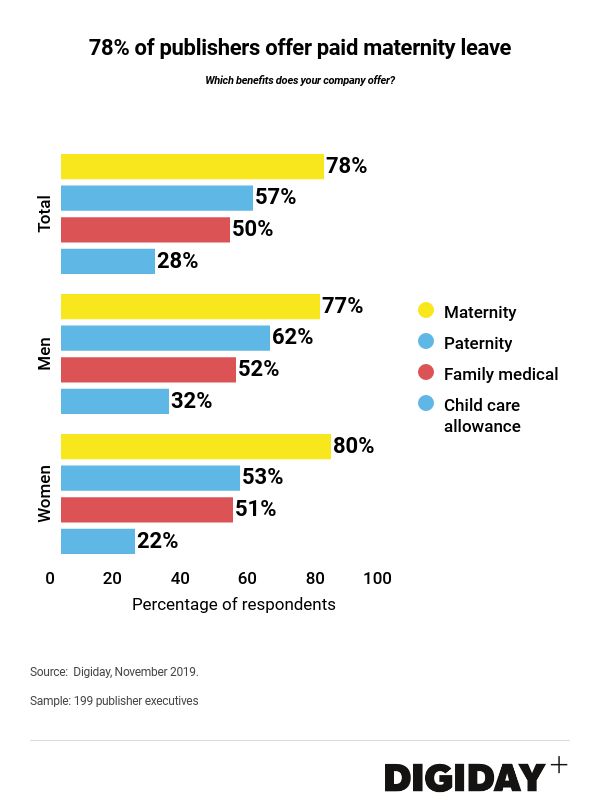Secure your place at the Digiday Media Buying Summit in Nashville, March 2-4
Digiday Research: 78% of publishers offer paid maternity leave

This research is based on unique data collected from our proprietary audience of publisher, agency, brand and tech insiders. It’s available to Digiday+ members. More from the series →
About 78% of the publishing executives polled in a new Digiday survey said their company provides paid maternity leave. And about half of the respondents said their organization offers paid family medical leave. But only 57% of those polled said their company grants paid paternity leave.
Last year about 33% of U.S. employers offered paid maternity leave, which represents a rise from 16% a decade ago, according to data from the Society of Human Resource Management.
And some major publishers have changed their policies recently. As of Jan. 1, The Washington Post expanded its paid parental leave policy from four weeks to 20; this matches the practices of The Wall Street Journal since 2017. The New York Times offers 16 paid weeks, while the Boston Globe offers just 10 weeks.
These numbers are just some of the results from Digiday’s new survey exploring publishing culture, work life and benefits. When the results were broken down by gender, they illustrated at least one interesting contrast.
More female respondents than men surveyed said their employer provided paid maternity leave — 81% compared to 78%. This suggests that women might be likelier to work at companies where paid maternity is offered.
Other national and global research has shown that without paid parental leave policies, female labor force participation drops. Paid maternity leave essentially encourages new mothers to return to work after having a child. A study at Google found that after the company increased its the length of its paid maternity leave, the attrition rate for new mothers there dropped 50%.
About 27% of the publishing employees surveyed said they receive an allowance for child care or have subsidized child care available at their workplace. In addition, almost half of the respondents receive a discount for a gym membership and 38% said their company distributes free snacks.
More in Media

From feeds to streets: How mega influencer Haley Baylee is diversifying beyond platform algorithms
Kalil is partnering with LinkNYC to take her social media content into the real world and the streets of NYC.

‘A brand trip’: How the creator economy showed up at this year’s Super Bowl
Super Bowl 2026 had more on-the-ground brand activations and creator participation than ever, showcasing how it’s become a massive IRL moment for the creator economy.

Media Briefing: Turning scraped content into paid assets — Amazon and Microsoft build AI marketplaces
Amazon plans an AI content marketplace to join Microsoft’s efforts and pay publishers — but it relies on AI com stop scraping for free.






